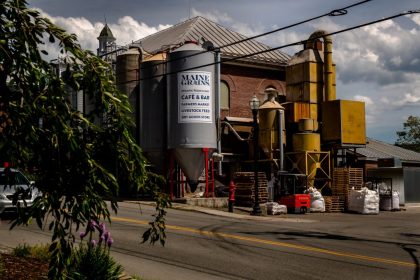
Keep baking bread. Small grain companies may suggest a better path for American business.
Originally published in the New York Times opinion section.
By the established logic of the business world, Maine Grains, a small miller of flour in a rural part of the state, should not exist. With some 20 employees, it mills about 2,000 tons of flour a year in an industry where larger companies can mill more than 20,000 tons a day. Grain has long been a commodity business, and milling is driven by size and scale. Yet tiny mills like Maine Grains and small brands like King Arthur Baking Company and Bob’s Red Mill are thriving. They raise a bold question: Could flour, of all products, suggest a better path for more of the U.S. economy?
Milling flour, at the risk of stating the obvious, is not a new business. The basic technologies of milling were invented sometime in the third century B.C. For the early centuries of American history, local mills, powered by water, were economic anchors for small towns across the American colonies and, later, the nation. Their physical legacy is the hundreds of old stone gristmills scattered around the country, some converted to other uses, others quietly decaying.
The abandoned mills are testament to the fact that during the 20th century, the business of flour was almost entirely overtaken by large, centralized operations. For many decades now, flour has been ruled by the central dogma of American business strategy: maximization of size and scale, ideally to the point of monopoly. Most of America’s large national corporations are built on this model. The exemplars, like pharmaceutical companies, airlines and cable operators, have particularly deep “moats” (barriers to competitive entry like patents) and fat profit.

This bigger-is-better, dominate-the-industry strategy is a major reason the American economy is as oligarchical and homogeneous as it is. It leads to large national companies that richly reward shareholders and executives while limiting workers’ salaries and reducing the prospects for smaller or local competitors. The sale of flour is no different.
Yet it is not these huge companies but the smaller sellers of flour that are flourishing. Consider King Arthur, founded in 1790 in Boston and now based in Vermont. It experienced a tripling of sales over the spring, buoyed by legions of new bakers in quarantine. (Sales at Gold Medal also went up, but not nearly as much.) Among consumers, King Arthur is probably best known for connecting with people who are learning to bake. Its website introduces them to new challenges, like building a sourdough starter and folding dough for baguettes, and the company has a hotline for bakers in distress.
But King Arthur is most distinguished by its corporate structure. It is a private company, owned entirely by its employees (it has about 350) and run by two chief executives. It is also a benefit corporation, which means that having a positive social impact is part of its legal corporate mission. Ralph Carlton, one of the company’s chief executives, says that its different structure leads it to act differently from other companies. “Being accountable to our employee-owners means we have to take them into account,” he told me. “We don’t believe in growth for growth’s sake. We are not under external requirements” from stock owners or market analysts.
Companies like Maine Grains and King Arthur are challenging the commodity pressures in flour markets using methods that were pioneered in the craft beer and local produce markets. The commodity industry takes flour as flour — just an ingredient, the cheaper the better. But baking is also an emotional experience, an act of creation in its beauty and intensity, a longstanding symbol of the home. And it provokes, in some, a yearning to connect with local soil and local land.
That’s the appeal of a company like Maine Grains, which operates out of a repurposed jailhouse, and a new generation of regional grain companies, like Cairnspring Mills in Washington State and Castle Valley Mill in Pennsylvania. These mills produce not only whole wheat flours but also distinctive grains, such as yecora rojo, heritage red fife and spelt. Amy Halloran, the author of “The New Bread Basket,” about the local grain industry, told me these companies are making an effort to deliberately ignore the single-minded approach of the commodity market in favor of “best practices” for their regions.

Offering a distinctive, high-quality product and engaging deeply with customers aren’t exactly new ideas. But they aren’t what has been called for in commodity-based businesses, which are trapped by global market prices and aim to control the market by brute efficiency. Yet King Arthur and the regional grain companies manage to sell their product at higher prices than do General Mills and Ardent Mills, and also manage to escape, to some degree, the relentless pressures of commodity pricing.
If King Arthur is basically a medium-size, employee-owned corporation that tries to be good, a regional mill like Maine Grains represents a more radical vision: the return of true agricultural localism. As Amber Lambke, the founder and chief executive of Maine Grains, told me, there’s more to that vision than selling a fancy type of flour. The local mill is the missing link in a local food economy that sees regional trade between farmers, bakeries, beer breweries and raisers of livestock.
The regional grain industry also employs more people, relative to its size: Whereas the giant mills are highly automated, run by employees sitting in a control room, stone-milling methods demand more labor. A place like Maine Grains will never come close to competing in terms of efficiency or price. Yet it exists and is growing.
Could more parts of the American economy be restructured along these lines, with employees as beneficiary-owners, with more people doing more work in companies operating on a more reasonable, human scale? We have, for the past few decades, put our faith in an economic model that insists that everyone will be better off if we do everything to make production as cheap as possible, keeping prices and salaries low, and make every region of the economy highly specialized. That approach, it turns out, does make some people rich, but it does not help everyone.
The flour industry might seem an unlikely arena for business innovation. There was once a time, in the 1990s and 2000s, when it was widely thought that Silicon Valley would show us the way to a better, fairer economy, creating entire ecosystems of companies with distinctive offerings. Yet that was before the emergence and eventual dominance of Amazon, Facebook and Google. Instead of high-tech, it is low-tech businesses like craft beer and community supported agriculture that seem to stand at the forefront of economic transformation.
If it can happen with flour, it can happen anywhere.




